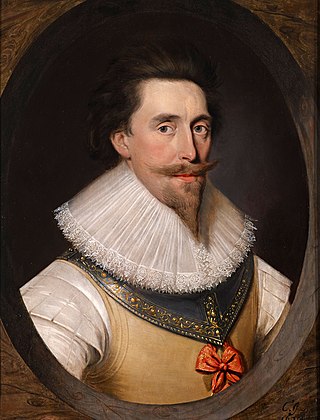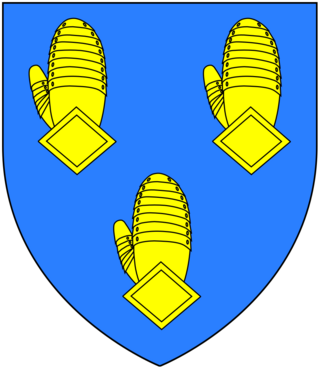Related Research Articles

1644 (MDCXLIV) was a leap year starting on Friday of the Gregorian calendar and a leap year starting on Monday of the Julian calendar, the 1644th year of the Common Era (CE) and Anno Domini (AD) designations, the 644th year of the 2nd millennium, the 44th year of the 17th century, and the 5th year of the 1640s decade. As of the start of 1644, the Gregorian calendar was 10 days ahead of the Julian calendar, which remained in localized use until 1923.
This article contains information about the literary events and publications of 1577.

Earl of Westmorland is a title that has been created twice in the Peerage of England. The title was first created in 1397 for Ralph Neville. It was forfeited in 1571 by Charles Neville, 6th Earl of Westmorland, for leading the Rising of the North. It was revived in 1624 in favour of Sir Francis Fane, whose mother, Mary Neville, was a descendant of a younger son of the first Earl. The first Earl of the first creation had already become Baron Neville de Raby, and that was a subsidiary title for his successors. The current Earl holds the subsidiary title Baron Burghersh (1624).

John Fane, 7th Earl of Westmorland, styled The Honourable John Fane from 1691 to 1733 and Lord Catherlough from 1733 to 1736, of Mereworth Castle in Kent, was a British Army officer and politician who sat in the House of Commons in three separate stretches between 1708 and 1734.

Francis Fane, 1st Earl of Westmorland, of Mereworth in Kent and of Apethorpe in Northamptonshire was an English landowner and politician who sat in the House of Commons between 1601 and 1624 and then was raised to the Peerage as Earl of Westmorland.

Mildmay Fane, 2nd Earl of Westmorland, styled Lord le Despenser between 1624 and 1628, was an English nobleman, politician and writer.

Fulbeck is a small village and civil parish in the South Kesteven district of Lincolnshire, England. The population taken at the 2011 census was 513. The village is on the A607, 9 miles (14 km) north from Grantham and 8 miles (13 km) north-west from Sleaford. To the north is Leadenham, and to the south, Caythorpe.
Nationality words link to articles with information on the nation's poetry or literature.
John Knewstub was an English clergyman and one of the participants in the Hampton Court Conference of 1604 representing the Puritan side. Patrick Collinson calls him presbyterian by conviction, but moderate in his views.

Lady Mary Fane (1639–1681) was the daughter of Mildmay Fane, 2nd Earl of Westmorland, who succeeded to the title in 1628 and died in 1666, and his second wife, Mary, daughter of Horace Vere, 1st Baron Vere of Tilbury, and widow of Sir Roger Townshend.

Vere Fane, 4th Earl of Westmorland, styled The Honourable Vere Fane from 1644 to 1661 and Sir Vere Fane from 1661 to 1691, was a British peer and Member of Parliament for Peterborough and twice for Kent.

Sir Anthony Mildmay of Apethorpe Palace, Northamptonshire, served as a Member of Parliament for Wiltshire from 1584 to 1586 and as English ambassador in Paris in 1597.

Sir Francis Fane of Fulbeck supported the Royalist cause during the English Civil War.

Lieutenant-Colonel Anthony Mildmay Julian Fane, 13th Earl of Westmorland, CBE, JP, styled Lord Burghersh between October 1859 and 1891, was a British peer.

Sybil Mary Fane, Countess of Westmorland, born Lady Sybil Mary St Clair-Erskine, was a British aristocrat and socialite.
Grace, Lady Mildmay was an English noblewoman, memoirist and medical practitioner. Her autobiography is one of the earliest existing autobiographies of an English woman. Originally from Wiltshire, she married Sir Anthony Mildmay in 1567 and moved to Apethorpe Palace, his father's home in Northamptonshire. She practised medicine on her family and others, with an extensive knowledge of medical theory, and a large repertoire of cures. Her writings included memoirs, medical papers and devotional meditations.
Jeremy Frank Maule was a British scholar specialising in English literature and the history of the English language. He had an especial interest in seventeenth-century poetry and in manuscripts from this period.

Rachel Bourchier, Countess of Bath, wife of Henry Bourchier, 5th Earl of Bath (1587-1654), was an English noblewoman and writer, best known for her activities during the English Civil War.

Susanna Temple, Lady Lister was an English courtier.
Mary Vere (1581–1671) was an English letter writer.
References
- ↑ "The Old Globe Theater History and Timeline" . Retrieved 2012-10-16.
- 1 2 Kekewich, Margaret (1994). Princes and peoples : France and British Isles, 1620-1714 : an anthology of primary sources. Manchester New York: Manchester University Press in association with the Open University. p. 2. ISBN 9780719045738.
- ↑ Greengrass, M. (2004). "Woodward, Hezekiah (1591/2–1675)". Oxford Dictionary of National Biography (Online ed.). Oxford University Press. doi:10.1093/ref:odnb/29945 . Retrieved 2013-10-25.(subscription or UK public library membership required)
- ↑ Cogley, Richard (1999). John Eliot's mission to the Indians before King Philip's War. Cambridge, Mass: Harvard University Press. p. 271. ISBN 9780674475373.
- ↑ Baigrie, Brian (1996). Picturing knowledge : historical and philosophical problems concerning the use of art in science. Toronto, Ont: University of Toronto Press. p. ix. ISBN 9780802074393.
- ↑ Danilo Capecchi (11 May 2012). History of Virtual Work Laws: A History of Mechanics Prospective. Springer Science & Business Media. p. 481. ISBN 978-88-470-2056-6.
- ↑ John Whenham (1982). Duet and Dialogue in the Age of Monteverdi. UMI Research Press. p. 279. ISBN 978-0-8357-1313-9.
- ↑ Tom Cain, ed., The Poems of Mildmay Fane, Second Earl of Westmorland: from the Fulbeck, Harvard, and Westmorland Manuscripts, Manchester, Manchester University Press, 2001.Page 27
- ↑ Christopher Baker (2002). Absolutism and the Scientific Revolution, 1600-1720: A Biographical Dictionary. Greenwood Publishing Group. p. 69. ISBN 978-0-313-30827-7.
- ↑ The Encyclopedia Americana: A Universal Reference Library Comprising the Arts and Sciences ... Commerce, Etc. Scientific American Compiling Dpt. 1905. p. 129.
- ↑ John Evelyn (2000). The Diary of John Evelyn: 1620-1649. Clarendon Press. p. 379.
- ↑ Baker, Christopher (2002). Absolutism and the scientific revolution, 1600-1720 : a biographical dictionary. Westport, Conn: Greenwood Press. p. 313. ISBN 9780313308277.